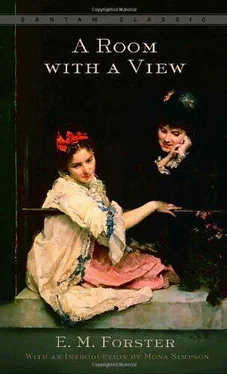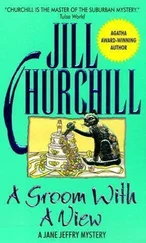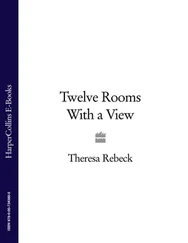Edward Forster - A Room with a View
Здесь есть возможность читать онлайн «Edward Forster - A Room with a View» весь текст электронной книги совершенно бесплатно (целиком полную версию без сокращений). В некоторых случаях можно слушать аудио, скачать через торрент в формате fb2 и присутствует краткое содержание. Жанр: Классическая проза, на английском языке. Описание произведения, (предисловие) а так же отзывы посетителей доступны на портале библиотеки ЛибКат.
- Название:A Room with a View
- Автор:
- Жанр:
- Год:неизвестен
- ISBN:нет данных
- Рейтинг книги:4 / 5. Голосов: 1
-
Избранное:Добавить в избранное
- Отзывы:
-
Ваша оценка:
- 80
- 1
- 2
- 3
- 4
- 5
A Room with a View: краткое содержание, описание и аннотация
Предлагаем к чтению аннотацию, описание, краткое содержание или предисловие (зависит от того, что написал сам автор книги «A Room with a View»). Если вы не нашли необходимую информацию о книге — напишите в комментариях, мы постараемся отыскать её.
A Room with a View — читать онлайн бесплатно полную книгу (весь текст) целиком
Ниже представлен текст книги, разбитый по страницам. Система сохранения места последней прочитанной страницы, позволяет с удобством читать онлайн бесплатно книгу «A Room with a View», без необходимости каждый раз заново искать на чём Вы остановились. Поставьте закладку, и сможете в любой момент перейти на страницу, на которой закончили чтение.
Интервал:
Закладка:
Cecil entered.
Appearing thus late in the story, Cecil must be at once described. He was medieval. Like a Gothic statue. Tall and refined, with shoulders that seemed braced square by an effort of the will, and a head that was tilted a little higher than the usual level of vision, he resembled those fastidious saints who guard the portals of a French cathedral. Well educated, well endowed, and not deficient physically, he remained in the grip of a certain devil whom the modern world knows as self-consciousness, and whom the medieval, with dimmer vision, worshipped as asceticism. A Gothic statue implies celibacy, just as a Greek statue implies fruition, and perhaps this was what Mr. Beebe meant. And Freddy, who ignored history and art, perhaps meant the same when he failed to imagine Cecil wearing another fellow's cap.
Mrs. Honeychurch left her letter on the writing table and moved towards her young acquaintance.
"Oh, Cecil!" she exclaimed—"oh, Cecil, do tell me!"
"I promessi sposi," said he.
They stared at him anxiously.
"She has accepted me," he said, and the sound of the thing in English made him flush and smile with pleasure, and look more human.
"I am so glad," said Mrs. Honeychurch, while Freddy proffered a hand that was yellow with chemicals. They wished that they also knew Italian, for our phrases of approval and of amazement are so connected with little occasions that we fear to use them on great ones. We are obliged to become vaguely poetic, or to take refuge in Scriptural reminiscences.
"Welcome as one of the family!" said Mrs. Honeychurch, waving her hand at the furniture. "This is indeed a joyous day! I feel sure that you will make our dear Lucy happy."
"I hope so," replied the young man, shifting his eyes to the ceiling.
"We mothers—" simpered Mrs. Honeychurch, and then realized that she was affected, sentimental, bombastic—all the things she hated most. Why could she not be Freddy, who stood stiff in the middle of the room; looking very cross and almost handsome?
"I say, Lucy!" called Cecil, for conversation seemed to flag.
Lucy rose from the seat. She moved across the lawn and smiled in at them, just as if she was going to ask them to play tennis. Then she saw her brother's face. Her lips parted, and she took him in her arms. He said, "Steady on!"
"Not a kiss for me?" asked her mother.
Lucy kissed her also.
"Would you take them into the garden and tell Mrs. Honeychurch all about it?" Cecil suggested. "And I'd stop here and tell my mother."
"We go with Lucy?" said Freddy, as if taking orders.
"Yes, you go with Lucy."
They passed into the sunlight. Cecil watched them cross the terrace, and descend out of sight by the steps. They would descend—he knew their ways—past the shrubbery, and past the tennis-lawn and the dahlia-bed, until they reached the kitchen garden, and there, in the presence of the potatoes and the peas, the great event would be discussed.
Smiling indulgently, he lit a cigarette, and rehearsed the events that had led to such a happy conclusion.
He had known Lucy for several years, but only as a commonplace girl who happened to be musical. He could still remember his depression that afternoon at Rome, when she and her terrible cousin fell on him out of the blue, and demanded to be taken to St. Peter's. That day she had seemed a typical tourist—shrill, crude, and gaunt with travel. But Italy worked some marvel in her. It gave her light, and—which he held more precious—it gave her shadow. Soon he detected in her a wonderful reticence. She was like a woman of Leonardo da Vinci's, whom we love not so much for herself as for the things that she will not tell us, The things are assuredly not of this life; no woman of Leonardo's could have anything so vulgar as a "story." She did develop most wonderfully day by day.
So it happened that from patronizing civility he had slowly passed if not to passion, at least to a profound uneasiness. Already at Rome he had hinted to her that they might be suitable for each other. It had touched him greatly that she had not broken away at the suggestion. Her refusal had been clear and gentle; after it—as the horrid phrase went—she had been exactly the same to him as before. Three months later, on the margin of Italy, among the flower-clad Alps, he had asked her again in bald, traditional language. She reminded him of a Leonardo more than ever; her sunburnt features were shadowed by fantastic rock; at his words she had turned and stood between him and the light with immeasurable plains behind her. He walked home with her unashamed, feeling not at all like a rejected suitor. The things that really mattered were unshaken.
So now he had asked her once more, and, clear and gentle as ever, she had accepted him, giving no coy reasons for her delay, but simply saying that she loved him and would do her best to make him happy. His mother, too, would be pleased; she had counselled the step; he must write her a long account.
Glancing at his hand, in case any of Freddy's chemicals had come off on it, he moved to the writing table. There he saw "Dear Mrs. Vyse," followed by many erasures. He recoiled without reading any more, and after a little hesitation sat down elsewhere, and pencilled a note on his knee.
Then he lit another cigarette, which did not seem quite as divine as the first, and considered what might be done to make Windy Corner drawing-room more distinctive. With that outlook it should have been a successful room, but the trail of Tottenham Court Road was upon it; he could almost visualize the motor-vans of Messrs. Shoolbred and Messrs. Maple arriving at the door and depositing this chair, those varnished book-cases, that writing-table. The table recalled Mrs. Honeychurch's letter. He did not want to read that letter—his temptations never lay in that direction; but he worried about it none the less. It was his own fault that she was discussing him with his mother; he had wanted her support in his third attempt to win Lucy; he wanted to feel that others, no matter who they were, agreed with him, and so he had asked their permission. Mrs. Honeychurch had been civil, but obtuse in essentials, while as for Freddy—"He is only a boy," he reflected. "I represent all that he despises. Why should he want me for a brother-in-law?"
The Honeychurches were a worthy family, but he began to realize that Lucy was of another clay; and perhaps—he did not put it very definitely—he ought to introduce her into more congenial circles as soon as possible.
"Mr. Beebe!" said the maid, and the new rector of Summer Street was shown in; he had at once started on friendly relations, owing to Lucy's praise of him in her letters from Florence.
Cecil greeted him rather critically.
"I've come for tea, Mr. Vyse. Do you suppose that I shall get it?"
"I should say so. Food is the thing one does get here—Don't sit in that chair; young Honeychurch has left a bone in it."
"Pfui!"
"I know," said Cecil. "I know. I can't think why Mrs. Honeychurch allows it."
For Cecil considered the bone and the Maples' furniture separately; he did not realize that, taken together, they kindled the room into the life that he desired.
"I've come for tea and for gossip. Isn't this news?"
"News? I don't understand you," said Cecil. "News?"
Mr. Beebe, whose news was of a very different nature, prattled forward.
"I met Sir Harry Otway as I came up; I have every reason to hope that I am first in the field. He has bought Cissie and Albert from Mr. Flack!"
"Has he indeed?" said Cecil, trying to recover himself. Into what a grotesque mistake had he fallen! Was it likely that a clergyman and a gentleman would refer to his engagement in a manner so flippant? But his stiffness remained, and, though he asked who Cissie and Albert might be, he still thought Mr. Beebe rather a bounder.
Читать дальшеИнтервал:
Закладка:
Похожие книги на «A Room with a View»
Представляем Вашему вниманию похожие книги на «A Room with a View» списком для выбора. Мы отобрали схожую по названию и смыслу литературу в надежде предоставить читателям больше вариантов отыскать новые, интересные, ещё непрочитанные произведения.
Обсуждение, отзывы о книге «A Room with a View» и просто собственные мнения читателей. Оставьте ваши комментарии, напишите, что Вы думаете о произведении, его смысле или главных героях. Укажите что конкретно понравилось, а что нет, и почему Вы так считаете.












